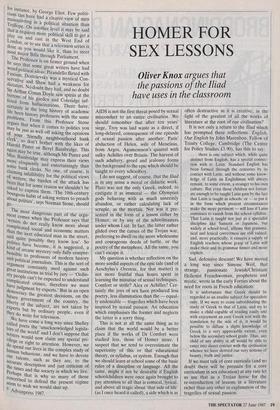HOMER FOR SEX LESSONS
Oliver Knox argues that
the passions of the Iliad have uses in the classroom
AIDS is not the first threat posed by sexual misconduct to an entire civilisation. We should remember that after ten years' siege, Troy was laid waste as a direct, if long-delayed, consequence of one episode of sexual passion after another: Paris' abduction of Helen, wife of Menelaus, from Argos, Agamemnon's quarrel with sulky Achilles over Briseis. The harvest of such adultery, greed and jealousy forms the background to the epic which shoUld be taught to every schoolboy.
I do not suggest, of course, that the Iliad is in any sense a moral or didactic work. Plato was not the only Greek, indeed, to castigate it as immoral -7 the Olympian gods behaving with as much unseemly abandon, or rather calculating lack of scruple, as the mortals. Nor was it pre- sented in the form of a lesson either by Homer, or by any of the schoolmasters under whom I sat. In fact, the latter rather glided over the causes of the Trojan war, preferring to dwell on the more wholesothe and courageous deeds of battle, or the poetry of the metaphors. All the same, you can't escape it.
My question is whether reflection on the more sordid aspects of the epic tale (and of Aeschylus's Oresteia, for that matter) is not more fruitful than hours spent in learning the minutiae of sexual techniques. Comfort or strife? Alex or Achilles? Cer- tainly the joys of sex have produced less poetry, less illumination than the — equal- ly undeniable — tragedies which have been inspired by sexual passion. An education which emphasises the former and neglects the latter is a sorry thing.
This is not at all the same thing as to claim that the world would be a better place if the works of Dr Comfort were studied less, those of Homer more. I suspect that we tend to overestimate the superiority of this or that educational theory, or syllabus, or system. Enough that we should learn at school some of the basic rules of a discipline or language. All the same, might it not be desirable if English schoolchildren were once again brought to pay attention to all that is comical, lyrical, and above all tragic about 'that side of life' (as I once heard it called), a side which is as often destructive as it is creative, in the light of the greatest of all the works of
literature at the root of our civilisation? It is not only a return to the Iliad which has prompted these reflections. English, Our English by John Marenbon, Fellow of
Trinity College, Cambridge (The Centre for Policy Studies £3.90), has this to say:
. . there is one subject which, while quite distinct from English, has a special connec- tion with it: Latin. Standard English has been formed through the centuries by its contact with Latin; and without some know- ledge of Latin an Englishman will always remain, to some extent, a stranger to his own culture. Bin even those children not fortun- ate enough to be taught Latin gain by the fact that Latin is taught in schools: or — to put it in the form which present circumstances make the more pertinent — will lose if Latin continues to vanish from the school syllabus. That Latin is taught not just as a specialist discipline like Sanscrit or Japanese, but widely at school-level, affirms that gramma- tical and lexical correctness are still valued; and, more practically, it ensures a supply of English teachers whose grasp of Latin will make their and its grammar firmer and more explicit.
Sad, defensive descant! We have moved a long way since Simone Weil, that strange, passionate Jewish/ChristianJ Hellenist Frenchwoman, prophetess and mystic, wrote in the early Forties about the need for roots in French education:
It is unfortunate that Greek should be regarded as an erudite subject for specialists only. If we were to cease subordinating the study of Greek to that of Latin, and try to make a child capable of reading easily and with enjoyment an easy Greek text with the translation by the side of it, it would be possible to diffuse a slight knowledge of Greek to a very appreciable extent, even below the secondary school grade. Thus, any child of any ability at all would be able to enter into direct contact with the civilisation whence we have derived our very notions of beauty, truth and justice.
If we must talk of core curricula (and no doubt there will be pressure for a core curriculum in sex education) at any rate let us use that as a Trojan horse for the re-introduction of lessons in a literature richer than any other in explanation of the tragedies of sexual passion.









































































 Previous page
Previous page